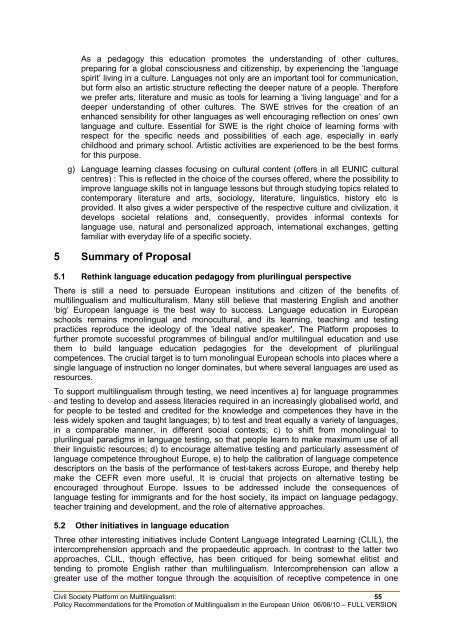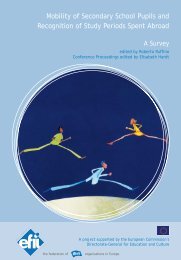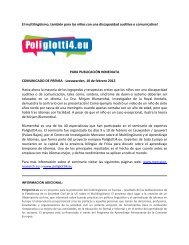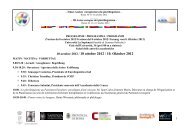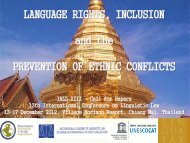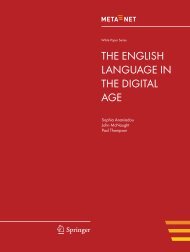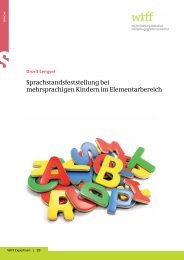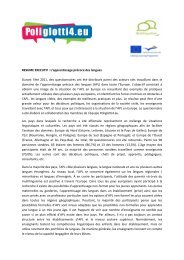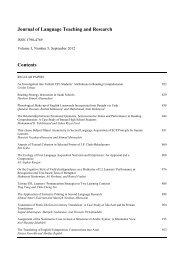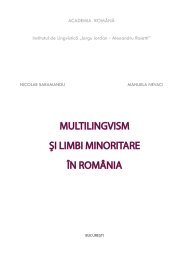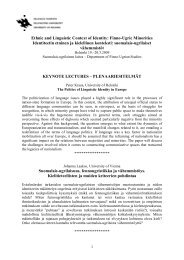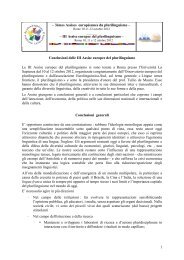FULL VERSION - European Commission - Europa
FULL VERSION - European Commission - Europa
FULL VERSION - European Commission - Europa
Create successful ePaper yourself
Turn your PDF publications into a flip-book with our unique Google optimized e-Paper software.
As a pedagogy this education promotes the understanding of other cultures,preparing for a global consciousness and citizenship, by experiencing the ‘languagespirit’ living in a culture. Languages not only are an important tool for communication,but form also an artistic structure reflecting the deeper nature of a people. Thereforewe prefer arts, literature and music as tools for learning a ‘living language’ and for adeeper understanding of other cultures. The SWE strives for the creation of anenhanced sensibility for other languages as well encouraging reflection on ones’ ownlanguage and culture. Essential for SWE is the right choice of learning forms withrespect for the specific needs and possibilities of each age, especially in earlychildhood and primary school. Artistic activities are experienced to be the best formsfor this purpose.g) Language learning classes focusing on cultural content (offers in all EUNIC culturalcentres) : This is reflected in the choice of the courses offered, where the possibility toimprove language skills not in language lessons but through studying topics related tocontemporary literature and arts, sociology, literature, linguistics, history etc isprovided. It also gives a wider perspective of the respective culture and civilization, itdevelops societal relations and, consequently, provides informal contexts forlanguage use, natural and personalized approach, international exchanges, gettingfamiliar with everyday life of a specific society.5 Summary of Proposal5.1 Rethink language education pedagogy from plurilingual perspectiveThere is still a need to persuade <strong>European</strong> institutions and citizen of the benefits ofmultilingualism and multiculturalism. Many still believe that mastering English and another‘big’ <strong>European</strong> language is the best way to success. Language education in <strong>European</strong>schools remains monolingual and monocultural, and its learning, teaching and testingpractices reproduce the ideology of the 'ideal native speaker'. The Platform proposes tofurther promote successful programmes of bilingual and/or multilingual education and usethem to build language education pedagogies for the development of plurilingualcompetences. The crucial target is to turn monolingual <strong>European</strong> schools into places where asingle language of instruction no longer dominates, but where several languages are used asresources.To support multilingualism through testing, we need incentives a) for language programmesand testing to develop and assess literacies required in an increasingly globalised world, andfor people to be tested and credited for the knowledge and competences they have in theless widely spoken and taught languages; b) to test and treat equally a variety of languages,in a comparable manner, in different social contexts; c) to shift from monolingual toplurilingual paradigms in language testing, so that people learn to make maximum use of alltheir linguistic resources; d) to encourage alternative testing and particularly assessment oflanguage competence throughout Europe, e) to help the calibration of language competencedescriptors on the basis of the performance of test-takers across Europe, and thereby helpmake the CEFR even more useful. It is crucial that projects on alternative testing beencouraged throughout Europe. Issues to be addressed include the consequences oflanguage testing for immigrants and for the host society, its impact on language pedagogy,teacher training and development, and the role of alternative approaches.5.2 Other initiatives in language educationThree other interesting initiatives include Content Language Integrated Learning (CLIL), theintercomprehension approach and the propaedeutic approach. In contrast to the latter twoapproaches, CLIL, though effective, has been critiqued for being somewhat elitist andtending to promote English rather than multilingualism. Intercomprehension can allow agreater use of the mother tongue through the acquisition of receptive competence in oneCivil Society Platform on Multilingualism: 55Policy Recommendations for the Promotion of Multilingualism in the <strong>European</strong> Union 06/06/10 – <strong>FULL</strong> <strong>VERSION</strong>


